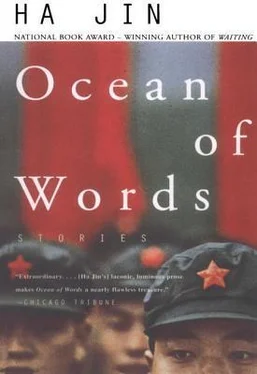“No. He has no big beard.”
“He used to have a long beard.”
“The Russian doesn’t look like an officer,” I said.
“No, you’re right, Song Ming,” the vice squad leader agreed. “He must be a soldier like us. Seems too young to carry bars and stars.”
At this moment, one officer took out a shiny toylike machine gun and a green walkie-talkie from the back of a jeep and handed them to the two officers waiting with cameras, who brought them immediately into the building to take photos. Those items must have been the most advanced Russian equipment. The walkie-talkie looked like a lunch-box. None of us could tell what model the machine gun was, because our handbook of Russian weapons did not give a picture of it.
There were two extra rooms downstairs, which we were told not to enter. In the morning the officers would use the rooms when they interrogated the Russian captive. In the afternoon he was free, so we had to “accompany” him.
Toward evening, another jeep came and brought over Chef Wang, who worked in Longmen City’s Guest Hotel. We heard that he was one of the best cooks in the province, and that his French cuisine had been highly appreciated by Premier Zhou Enlai. Certainly we had to eat our sorghum and rice, but we felt that eventually we might be able to take a bite of something unusual, since we had such an important “guest” among us. We enjoyed smelling the fragrance of the dishes prepared for the foreigner, which soon filled the first floor and the stairwell.
The Russian was called Lev Petrovich. According to his own account, he was a new soldier who had just arrived at the border. He used to serve as an orderly at the Headquarters of the Far East Military Region. Because of being lazy, he was sent to the Siberian border. That is what he said. It troubled us. We could not decide who he actually was and the true reason why he had crossed the border. Was he really a new soldier? Or was he an experienced agent? Did he come over to get information? Whom did he plan to meet? Or was it true as he said that the older soldiers forced him to carry both the machine gun and the walkie-talkie during their patrol along the border and that they deliberately gave him a hard time — not waiting for him when he was moving his bowels in the bushes — so he went astray and wandered onto our side? A group of peasants working in a hemp field saw him from far away. They deployed themselves as a trap. As soon as he entered the “bag,” they jumped out, raising sickles, stones, hoes, and rifles, shouting: “Put down your weapon and we’ll spare your life!” Lev didn’t fight and just gave them his gun. This again puzzled us. It looked as though everything had been planned — he didn’t even try to escape. Those officers questioned him every morning and didn’t believe whatever he told them.
Chief of Staff Shun came to the interrogation for the first few days. Then Lev was left completely in the officers’ hands. Our squad’s major task was to stand the night guard. It was not a big thing, since each of us only had to stay awake for one hour in the hall. We didn’t have to stroll around outside in the dark. In the morning we did nothing about him, so we studied the Manifesto of the Communist Party for two hours. In the afternoon, after two hours’ nap, we played games with him if he wanted. He didn’t join us very often in the beginning and read by himself a lot. Interpreter Zhang kept him company most of the time, because we couldn’t make out what he babbled. They slept in the same room, where two mosquito nets hung on either side of the window, whose opening was blocked by six iron bars. Mr. Zhang had many of his books sent over, and the other small room was used as their study. I had never seen so many books, which filled four tall bookcases standing against the walls. Many of the bricklike books had pictures on their spines. Those were the portraits of Russian authors, some of whom had a big beard similar to Marx’s or Engels’s. We were awed by Mr. Zhang’s books. We had heard that his father had been a general in Warlord Zhang Zuolin’s army, and that his wet nurse was a Russian woman, so he could speak Russian fluently when he was a boy. But we hadn’t imagined the interpreter knowing all those books. What a wise old gentleman. In fact, he was not so old, about forty-five, I think. Only his skin shriveled around his slender bones, and his narrow eyes looked bleary behind the thick glasses.
Sure enough, those books impressed Lev too. During the first two weeks, he always stayed in the study, reading and writing. We didn’t expect him to be such a bookworm and also a lover of poetry. One early morning, we returned from our exercises and heard Lev shouting madly on the second floor. Hurrying upstairs, we ran into Interpreter Zhang in the corridor.
“What’s the matter with him?” Squad Leader Shi asked.
“Nothing is wrong,” Mr. Zhang said. “He’s reading out Pushkin.”
The door of the study was open. Holding a large book in his hands, Lev was yelling at the bright dawn beyond the window. His face looked sweaty and burning hot. Mr. Zhang went into the study and patted him on the shoulder. They talked and both sat down.
Soon we saw Mr. Zhang pacing up and down in the room with both hands in his trouser pockets, and we heard him humming Russian words, which must have been poetry, probably Pushkin’s. Lev sat there stock-still, his eyes following Mr. Zhang and his large ears perked up. It was a long poem, for it took Mr. Zhang about ten minutes to finish. No sooner had he stopped than Lev got up and embraced his interpreter, murmuring something to him. Then we saw Lev pull a handkerchief out of his pocket and wipe his eyes with it. Mr. Zhang smiled, looking amused. We all thought it funny: Lev was like a woman, who would cry for beautiful words.
As our squad leader had predicted, Lev’s uniform did look like gunnysack rags after a few washes. Now he wore our Dacron uniform, but without the red badges on his collar and the red star on his cap. Though he asked for a pair of badges and a cap insignia, the officers refused him. They said it was too soon for him to switch sides. As a matter of fact, he had thrown away all his Russian stuff, including the clumsy boots and foot wrappings, and instead he wore our green sneakers and cotton socks. It was funny that you could easily take him for one of us if you looked at him from behind. Once Vice Squad Leader Hsu tapped Lev on the neck, believing he was Wang Min, and said, “When will you buy us the Popsicles you promised?” Lev turned around, his gray eyes glittering with bewilderment, and his square, whiskered face broke into a feline grin. The large wart on his upper lip merged with his left nostril. Hsu was struck dumb. We all laughed and shouted: “Popsicles, five fen apiece,” just as the old women vendors did on the streets.
Lev was an arrogant son of a bitch as well. Because we had been treating him as a guest, he was spoiled. He only smoked the two most expensive kinds of cigarettes: Ginseng and Great China. The staff officer Scholar Wang once gave him some Peony cigarettes, but Lev, after trying one, refused to accept them. He only wanted the best of the Chinese and took his privileges for granted. Naturally, he didn’t know how to respect his hosts. One day he even stood on his hands on the head of our plank bed for a good two minutes. Having landed on the floor, he waved and seemed to invite us to a gymnastic contest. None of us could do that. Perhaps in his eyes we were all clodhoppers and didn’t know how to do gymnastics or read those fat books.
He was smart indeed. On his desk there was a thick pile of paper, about two hundred pages. Mr. Zhang said those were Lev’s thoughts on Lenin’s State and Revolution . But all his smartness only caused more trouble for himself. No one would believe that a common Russian soldier could write an article the length of a book and could use the horizontal bar like a professional athlete. The more you thought about him, the more he looked like a well-trained agent.
Читать дальше











